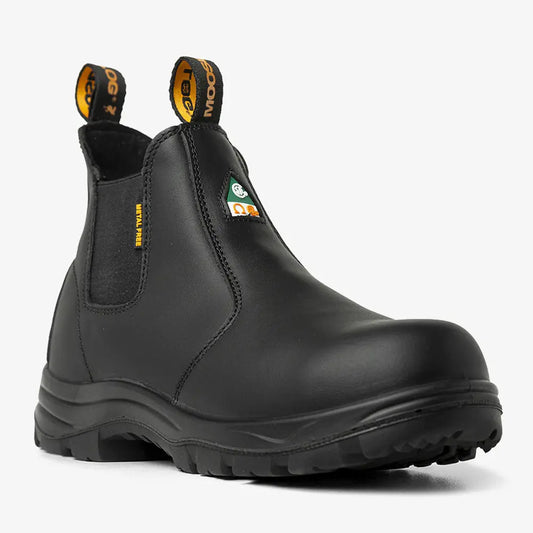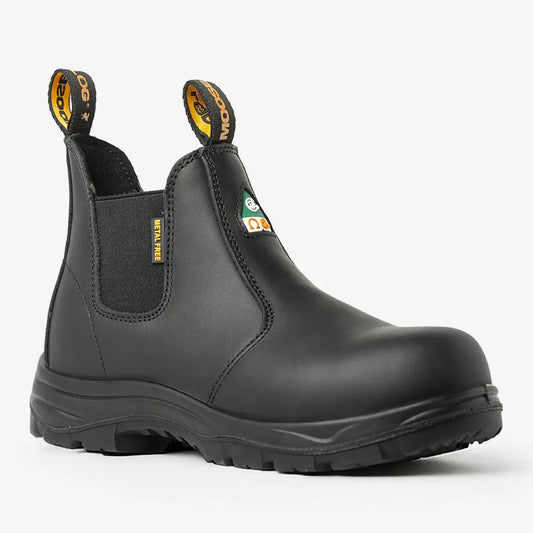Are Composite Toe Boots CSA Approved? Here's What You Need to Know
When it comes to safety footwear in Canada, CSA certification isn’t optional—it’s a legal requirement for many job sites. If you’re considering switching to composite toe boots, you might wonder: Are they CSA approved?
The short answer is: Yes, composite toe boots can be CSA certified, as long as they meet the required testing standards.
What Is CSA Certification?
CSA stands for the Canadian Standards Association, which sets the national standard for safety footwear in Canada through the CSA Z195 regulation.
CSA Z195 covers:
- Impact resistance
- Compression resistance
- Puncture resistance
- Electrical shock protection
CSA-compliant boots are tested to ensure they can protect the wearer in high-risk environments, including construction, warehousing, manufacturing, and more.
Do Composite Toe Boots Meet CSA Standards?
Yes. Many composite toe boots are specifically designed to pass CSA Z195 testing. Despite being made of non-metal materials like carbon fiber, Kevlar, or fiberglass, they provide:
- Impact resistance (toe protection)
- Compression resistance (load-bearing strength)
- Optional puncture-resistant plates (composite or metal midsoles)
As long as the manufacturer submits the product for testing and it passes all applicable categories, the boots can carry the CSA label.
How to Tell If Boots Are CSA Certified
Look for the CSA label or icons on the boot tongue, liner, or box. You’ll usually see:
- A green triangle: Puncture-resistant sole + Grade 1 toe cap (most common for industrial work)
- A yellow triangle: Non-puncture-resistant sole + Grade 2 toe cap (light-duty)
- Other symbols: Electrical hazard, static dissipation, metatarsal protection, etc.
ASTM vs CSA: What’s the Difference?
- CSA Z195: Required in Canada. Regulated by provinces.
- ASTM F2413: Required in the U.S. OSHA recognizes this standard.
If you're working in Canada, always ensure your boots are CSA certified, even if they also meet ASTM standards. Many boots (like those on MooseLog) carry dual certification for cross-border compliance.
Why CSA Composite Toe Boots Are a Great Choice
Composite toe boots that meet CSA standards offer:
- Lightweight comfort
- Electrical resistance
- Metal detector compatibility
- Full legal compliance for Canadian job sites
They’re ideal for electricians, airport staff, delivery drivers, light industrial workers, and anyone who needs metal-free CSA footwear.
FAQ: Composite Toe & CSA Certification
Q1: Are all composite toe boots CSA approved?
No. Only those tested and certified under CSA Z195 are CSA approved. Always check the label.
Q2: Can boots be both ASTM and CSA certified?
Yes. Many premium boots, like those from MooseLog, carry both certifications.
Q3: Where can I find CSA composite toe boots?
Look for CSA-certified boots on trusted retailers like MooseLog.com, which list certification clearly on product pages.
Q4: Are CSA-certified boots mandatory in Canada?
Yes, for many regulated job sites, CSA Z195 footwear is a legal requirement.
Conclusion
Yes—composite toe boots can be CSA approved, as long as they pass CSA Z195 testing. If you need lightweight, metal-free footwear that complies with Canadian safety laws, composite toe boots are a smart and legal choice.




